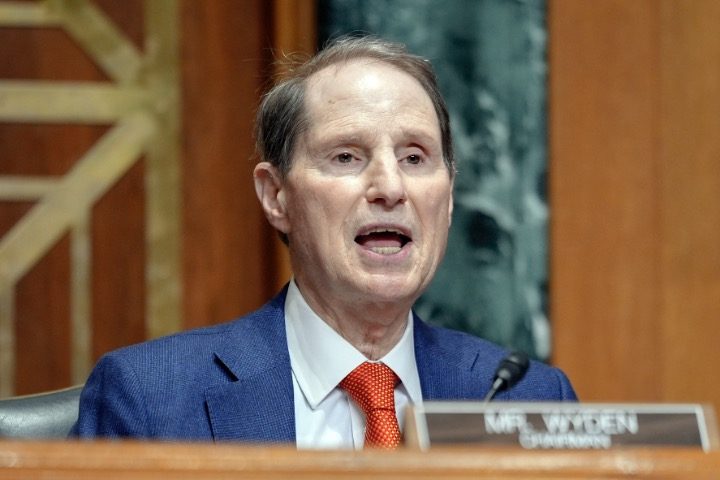
Sen. Ron Wyden (D-Ore.) unveiled a sweeping piece of legislation on Thursday designed to reform the U.S. Supreme Court, addressing what he has described as a “legitimacy crisis” plaguing the institution.
The bill, dubbed the “Judicial Modernization and Transparency Act,” proposes increasing the number of justices from nine to 15. This expansion would occur over three presidential terms. It also would require all justices to publicly disclose their tax returns.
In a press release, Wyden highlighted the urgency of “restoring public trust” in the judiciary. He noted that the bill’s broader objective is to enhance transparency and improve access to justice for Americans:
The Supreme Court is in crisis, and bold solutions are necessary to restore the public trust. More transparency, more accountability, and more checks on a [power-hungry] Supreme Court are just what the American people are asking for.
In an interview with The Washington Post, Wyden elaborated on his proposals and emphasized the need to reduce America’s highest court’s perceived politicization. Reported the Post:
“It’s not an atomic secret that the process for selecting justices is politicized,” Wyden said. “You’ve got this thoroughly politicized process resulting in a Supreme Court that now frequently issues sweeping rulings to overturn laws and upend precedents. We are proposing a way to restore some balance between the three branches of government.”
What better way to reduce politicization than by adding more justices, hoping they’ll rule the “right” way next time?
Key Provisions
The legislation outlines several major reforms presumably intended to modernize the judiciary and reduce political bottlenecks:
Court Expansion. The bill calls for the gradual expansion of the Supreme Court to 15 justices over 12 years. Presidents would be able to appoint one new justice in the first and third years of their term.
Supermajority Requirement. A supermajority of two-thirds of the justices would be required for the Supreme Court to overturn acts of Congress, limiting its ability to invalidate legislation without substantial consensus.
Automatic Vote on Nominations. Supreme Court nominees would automatically be placed on the Senate calendar for a vote if no action is taken within 180 days.
It would also split the 9th Circuit, one of the largest and most influential appellate courts, creating a new Southwestern Circuit. And it would increase the number of circuit and district court judgeships to “improve access to justice.”
“Transparency and Accountability”
Wyden promotes his proposal as a means to enhance the transparency and accountability of the Supreme Court. The bill includes provisions requiring justices to publicly release their votes on recusal motions and other appellate cases. It also introduces new financial oversight measures, mandating that all justices submit their income tax returns for public review.
Additionally, it mandates that the IRS audit each justice’s tax returns and publicly release them within 90 days.
The bill comes amid growing concerns about ethical lapses within the judiciary. For instance it was recently revealed that Justice Clarence Thomas accepted luxury trips from GOP megadonor Harlan Crow. Wyden has taken an active role in investigating Crow’s financial dealings. As chair of the Senate Finance Committee, he intensified his inquiry after reports that Crow gifted Thomas expensive trips on private jets and yachts. These trips were not disclosed on Thomas’ financial forms. Wyden believed Crow may have deducted the cost of these trips as business expenses to reduce his tax burden.
Following the controversy, Thomas released a statement asserting that he had been advised the trips fell under “personal hospitality” and therefore did not need to be reported. He emphasized that he had actively worked to comply with disclosure rules and received assurances from colleagues that reporting the trips was unnecessary.
Anti-Trump Move
Wyden’s legislative efforts seem to be strongly driven by his opposition to former President Donald Trump and the significant impact Trump has had on the judiciary. Wyden himself admitted that his push for reform is aimed at curbing what he calls Trump’s “radical right-wing Supreme Court.” In July, the senator introduced a bill specifically targeting the influence of Trump-appointed justices. This bill seeks to give Congress the authority to overturn judicial decisions that “clearly undermine the congressional intent of laws,” especially in light of the contentious Loper Bright decision.
The Loper Bright case, formally known as Loper Bright Enterprises v. Raimondo, was a pivotal 2024 Supreme Court decision that overturned the long-standing Chevron doctrine. For 40 years, the Chevron doctrine allowed federal agencies to interpret ambiguous statutes as long as their interpretations were reasonable. However, in Loper Bright, the Court determined that it was the judiciary’s role — not agencies’ — to interpret laws, even in cases of ambiguity.
He has also pushed to end the practice of “judge shopping.” This occurs when plaintiffs seek out judges known for issuing favorable rulings. According to Wyden, this practice consolidates judicial power in ways that impact millions of Americans. For him, the proposed reforms are a necessary response to what he sees as the dangerous legacy left by Trump’s influence on the court.
Criticism
Wyden’s bill already faces strong opposition from conservatives and legal figures who view it as a dangerous overreach that could destabilize the judicial system.
One of them is Carrie Severino, the president of the Judicial Crisis Network. She labeled the bill “the most radical and dangerous legislation to date aimed at destroying the Supreme Court as we know it.”
Severino argued that the bill would undermine the judiciary’s integrity by adding justices, and criticized the mandatory IRS audits as an additional burden on the Court. Furthermore, Severino contended that requiring a supermajority to overturn Congressional laws would severely weaken the Court’s ability to act as a check on legislative power. She likened the proposal to the most severe assault on the Court since Franklin D. Roosevelt’s controversial court-packing plan.
“When Trump wins back the White House, he should pack the court with six more Clarence Thomas justices. Let’s see how Democrats like that,” posted Conservative Brief.
Democrats
Democrats have increasingly called for expanding the U.S. Supreme Court in response to concerns about the Court’s current conservative majority. This push comes after several key rulings, such as the reversal of Roe v. Wade and decisions perceived as favoring corporate and conservative interests, which have heightened Democratic frustrations.
President Joe Biden, while not outright endorsing court expansion, formed a bipartisan commission in 2021 to study potential reforms, including adding justices. The commission’s final report was inconclusive on whether expansion was a viable solution, reflecting divided opinions even within Democratic circles. However, the idea has gained traction among progressives and some mainstream Democrats.
In 2021, Rep. Jerrold Nadler (D-N.Y.) and Sen. Ed Markey (D-Mass.), introduced a bill to increase the number of Supreme Court justices from nine to 12. The bill was reintroduced in 2023. The proposal has drawn support from some progressive organizations, but it remains highly controversial and faces strong opposition from Republicans.

































